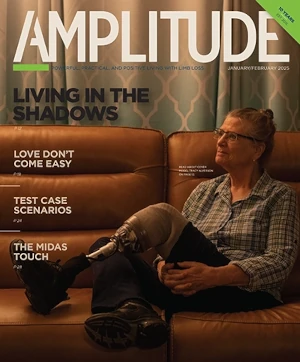The ADA Generation Comes of Age
by Rene Agredano
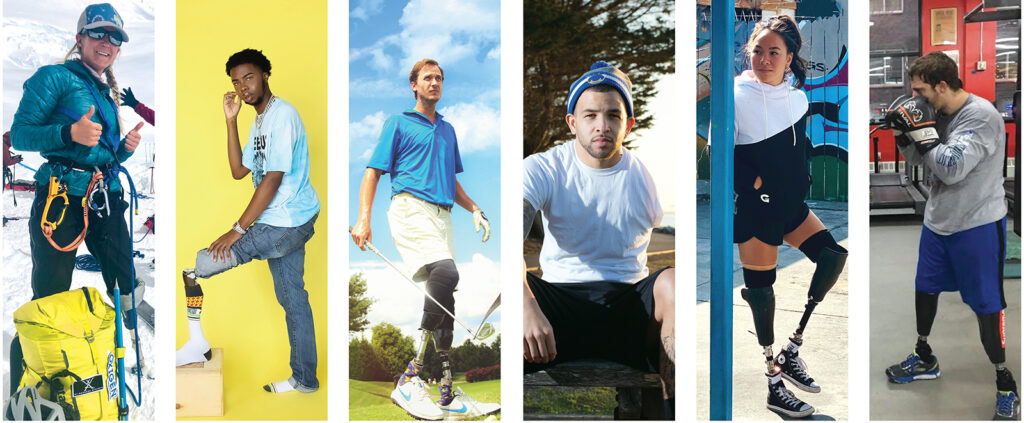
Millennial and Gen Z amputees aren’t waiting for permission to create a better world. Born after (or just before) passage of the Americans With Disabilities Act, these digital natives are empowered by technology and eager to build on the progress of their predecessors. They’re making an impact as social media influencers, advocates, organizers, role models, and entrepreneurs, helping to create a brighter future for all. Meet six young amputees who are the change they want to see.
Troy Druppal, age 30
Basketball Coach, Mentor
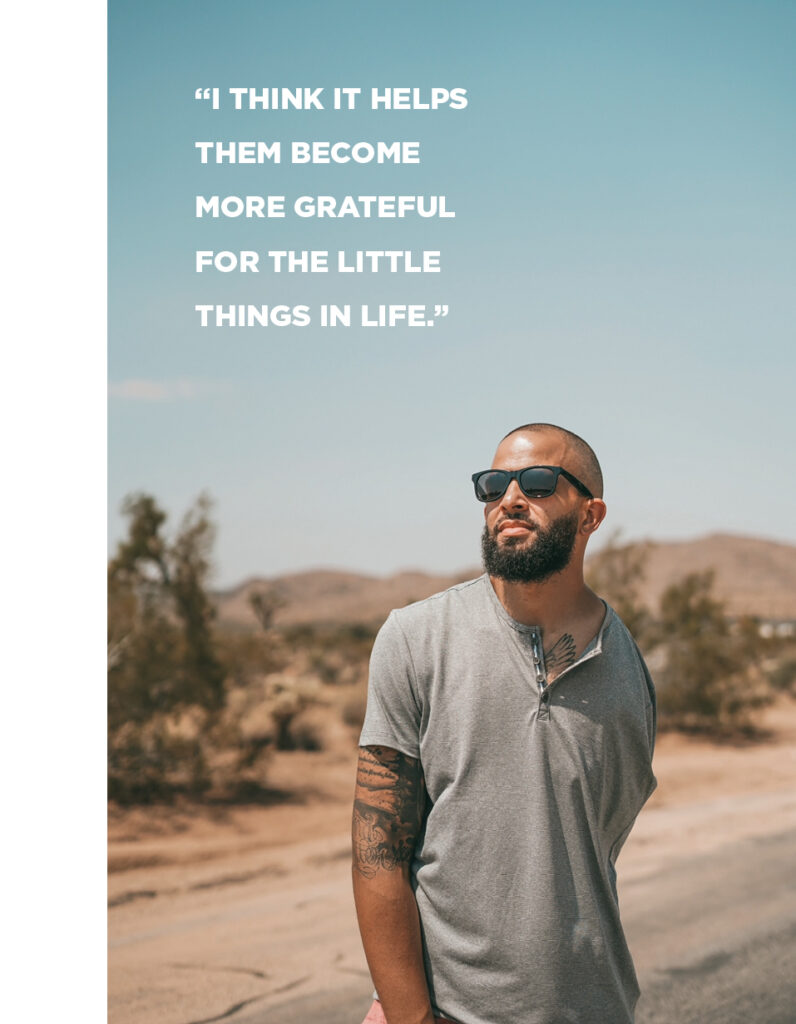
San Francisco Bay Area kids who enter the Golden State Warriors Basketball Academy dream of playing professionally. Most won’t get to the National Basketball Association (NBA), but those lucky enough to be coached by Troy Druppal gain something even more extraordinary: the perspective that anything is possible.
“It’s fair to say you don’t see many amputees in day-to-day life, so when 200 kids come to a basketball camp, one of the last things they would expect to see is an arm amputee who is a coach but can also play,” says Druppal. “After being around me for about a week and watching me coach, play, tie my shoes, etcetera, I believe they see that we are no different and still can live life as if we have two arms. I think it helps them become more grateful for the little things in life.”
Named Local NBA Coach of the Year in 2020, the Richmond, California, native has deep ties to the sport that got him through a ten-year cancer fight that took his arm. Now cancer-free, Druppal learns just as much from young players as they from him. One of the greatest teaching moments often happens during a player’s first meeting with the coach. “I’ve heard everything from, ‘Hey, look he only has one arm!’ and I have also heard, ‘Excuse me, coach, do you mind if I ask what happened to your arm?”’ The reactions teach Druppal patience while serving as a reminder of his ability to help people understand differences. “I can’t be mad at an eight-year-old who points his finger at me, because he is only eight and might not have ever seen an amputee or was taught how to act when you see someone who looks different,” he explains. Follow Troy Druppal on Instagram. Read Amplitude‘s interview with Troy Druppal from July 2020.
Sgt. Kirstie Ennis, age 29
Marine, Mountaineer, Adventure Philanthropist
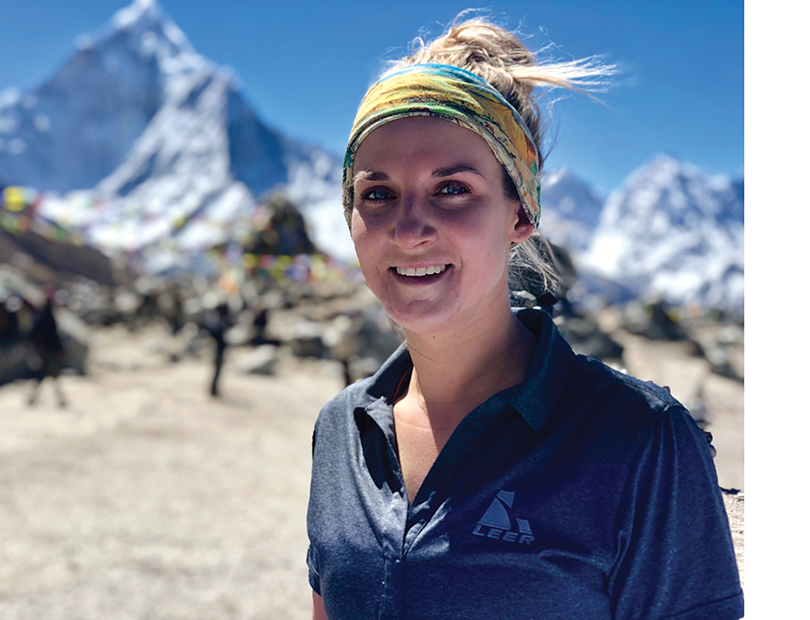
When a 2012 combat helicopter crash in Afghanistan ended her military career and caused life-threatening injuries and a leg amputation, Kirstie Ennis was in a dark place. But with help from others, she made it out the other side. Today, this 2019 Pat Tillman Service Award honoree helps people do the same and summit the mountains in front of them.
“My main social impact focus, currently, is mobility—for the abled and differently abled,” she says. Through the power of her Kirstie Ennis Foundation and outdoor sports, she helps people get out from behind their screens and into action. “My goal is to inspire people to move, and to give the gift of mobility to others.”
The Florida native discovered her aptitude for mountain sports soon after limb loss. Snowboarding came first, and she competed in the Paralympic boardercross and banked slalom events. Next came mountaineering. “In a last-ditch effort to preserve my sanity, I decided to climb Kilimanjaro just four months after having more of my femur cut out,” she recalls. “I realized that I was good at mountaineering—probably just because I’m strong, stubborn, and stupid enough to forget how bad it sucks—and could actually do it with passion and purpose.”
Among many accomplishments and thousands of dollars she’s raised for charities, one of her biggest campaigns has been the foundation’s Climbing for a Cause Initiative to summit the highest mountain on each of the seven continents. When the pandemic is over, she will ascend the last two peaks of the effort, Antarctica’s Mount Vinson and Alaska’s Denali. Meanwhile, she trains while fearlessly sharing social media posts about her victories and struggles. “Just because people see a powerful photo, they won’t know the struggle and pain behind it unless we are genuine with sharing our process.” Learn about the Kirstie Ennis Foundation.
Jordan Thomas, age 32
Youth Advocate, Philanthropist, Policymaker

Most teens don’t have health insurance on their mind. But in 2005, when Jordan Thomas lost both legs below the knee in a boating accident at age 16, he quickly discovered the inadequacies of health insurance coverage for children with limb loss. From his hospital bed, Thomas observed that many of his peers lacked access to prostheses. He felt compelled to do something about it, and friends and family helped him create the Jordan Thomas Foundation to provide free prostheses to children.
“I knew nothing about how insurance companies cover prosthetics. And then all of a sudden, my life just changed in an instant, and I saw too many kids that didn’t have prosthetics,” Thomas explains. “As I learned more and more, I saw that we had a problem: Kids are not given the prosthetics that they deserve.” They outgrow prostheses faster than insurance companies will pay for them, he explains. “If they’re lucky enough to have health insurance, they’re still denied access to the very thing they need to lead active and healthy lives. I felt like it was incumbent upon me to take action.”
The charity currently sponsors prosthetic needs for 48 kids through age 18 and is always accepting applications. From providing prostheses for walking or for specific activities and even sponsoring sports activities, Thomas’ foundation is a total support system. “That ripple starts to expand exponentially because these kids aren’t limited by their disability now,” he says. “They have the opportunity to go out and pursue whatever dreams and goals they have, without limitations.”
Thomas’ greatest hope is to create long-term change through legislation requiring health insurance companies to adequately cover children’s prosthetic needs. “Families should never have to worry about their kids not getting the limbs they need,” he says. Visit the Jordan Thomas Foundation.
Keith Parris, age 22
Artist, Activist, Style Icon

He always knew being in the spotlight was his destiny, but he never thought writing a book would put him there. Born in Brooklyn without a tibia in his left leg, Parris began his meteoric rise to social media fame in 2014 when, at 15 years old, he wrote a book called Amputee Story on the Wattpad publishing platform. Heartfelt and candid, it revealed his struggles with bullying, self-harm, eating disorders, and his parents’ reaction to his identity as gay. He recalls being shocked that his story resonated with thousands of youths facing similar troubles. “It was a good way to debut on social media, in a positive light. I’m grateful that my come-up was with my own book,” Parris says.
Following Amputee Story, he embraced Instagram and published daring posts about fashion, makeup, queer culture, and body positivity. Influencers noticed, and major media like VH1, Time Out New York, and the New York Post recognized his style and creativity. Brands began contacting him with collaborations and invites to notable events like New York Fashion Week. “Senior year I was really on my hustle and grind,” he recalls. From his earliest days of celebrating life as “The Icy Amputee Warrior,” Parris says being an influencer has given him a superpower to help educate and inspire others. Reaching people who can benefit from his inspiring ideas about confidence, fashion, beauty, and lifestyle has been his goal ever since.
Named to the 2020 Out Magazine Top 100 List, he sees acting roles in his future and a YouTube video series about being an amputee. “When I was little, I always wanted to look up to someone who was just like me,” he explains. Follow Keith Parris on Instagram.
Haven Shepherd, age 17
Athlete, Model, Acceptance Advocate
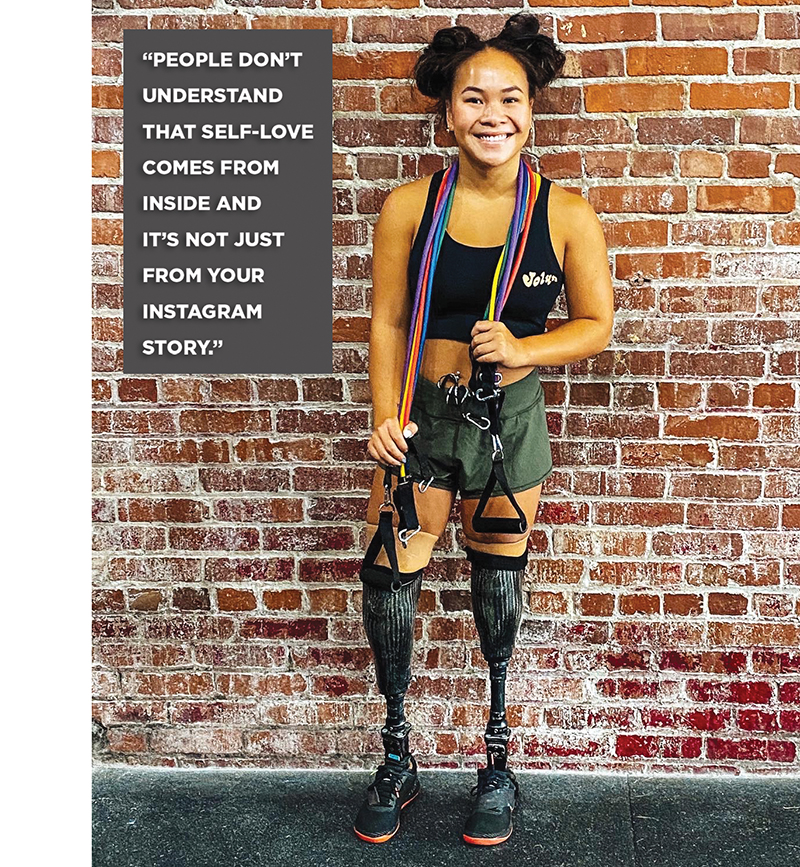
Ranked sixth in the world in the 100-meter breaststroke, Shepherd is leveraging her athletic accomplishments with a thriving modeling career that honors body positivity and self-confidence among her 20,000-plus Instagram followers. “I want to show people that it really doesn’t matter what circumstances you are going through, you can always overcome them,” she says.
Born into poverty in Vietnam, Shepherd was 14 months old when she was injured in a family suicide bombing that killed her parents and led to the amputation of her legs. Adopted shortly afterward by a large family in Carthage, Missouri, she grew up surrounded by six supportive, athletic siblings and many friends who inspired and encouraged her to pursue life without limits.
Today, Shepherd exudes the wisdom of a wise old soul. She’s outgoing but says she’s also a homebody and socially awkward. She prefers daily routines and order, two traits that helped her enjoy early success in competitive swimming at the elite level. She went to her first Paralympic trials at age 12, and although she’s disappointed that the pandemic postponed her first appearance at the Games, she feels the delay has given her better coping skills to train and be away from friends and family. “I’m more equipped to go, emotionally and physically,” she says.
Meanwhile, Shepherd makes the most of her social media presence and modeling career. Apparel companies from Jolyn Swimwear to Tommy Hilfiger embrace her in their campaigns, which further her goal of celebrating inclusion, diversity, and body acceptance. “We’re living in such a day and age where not caring how you look is the most important thing right now, but also looking your best is the most idolized thing,” she says. “People don’t understand that self-love comes from inside and it’s not just from your Instagram story.” Watch Enabled: The Haven Shepherd Story on YouTube.
Sam Rossiello, age 28
Corporate Change Advocate for Diversity and Inclusion

Like most able-bodied people, living with a disability was not something Sam Rossiello ever really considered. But when a 2016 subway accident resulted in bilateral lower-limb loss, he immediately discovered the reality of navigating a world that doesn’t always live up to the promise of the ADA. As an analytics manager for a global consulting firm, Rossiello is working to go beyond the ADA by minimizing workplace obstacles faced by people with disabilities.
“Some people are just too shy to talk about it, and want to just fit in,” he explains. “So they just deal with things that are not good for them.” Rossiello believes that many younger people do not fully understand the rights provided to them by the ADA.
As part of his company’s mental health and disability advocacy teams, Rossiello plays an integral role in designing internal systems that address all forms of disability. For example, he says he envisions “an opt-in disability identity, so that any facilitators of company trainings or meetings would know that you had a disability, and they would be able to shape the training to your needs.” He also advocates for a centralized call center to answer questions related to disability accommodations at company offices around the world. Removing roadblocks to hiring is another goal, such as ensuring that adaptive technology is available during interviews for job candidates. Follow Samuel Rossiello on Instagram. Read Amplitude‘s interview with Samuel Rossiello from September 2020.
Change is tough at any age, but the early accomplishments of Druppal, Ennis, Thomas, Parris, Shepherd, and Rossiello make it look easy. As representatives of the post-ADA generations, these six remarkable individuals are making an impact on the world at a pace that foretells of even more good things to follow for humanity.


